|
De Tsjechische dichter en vertaler Vítezslav Nezval werd
geboren op 26 mei 1900 in Biskoupky. Zie ook alle tags voor Vítězslav Nezval
op dit blog.
Fireworks
1924, A Cinemagenic Poem (Fragment)
the detective while choosing a magazine stares
deep into the ladys eyes (medium close shot)
the lady getting up (full shot)
the detective grabs his heart & sinks down to the floor (fade out)
a crowd of guests & waiters
the lady puts a handkerchief on the detectives head
(close-up) the detectives hand picking a photo & 2 tram tickets from the
ladys bag
in the fields the hare is pricking up its ears
a railway station where a train is being boarded
a gentleman with monocle at ticket counter
a hand plugging lines in at the phone exchange
the detective makes a call while staring at the tram ticket
index finger in the book
the tram ticket held in two hands as it grows in size till it dissolves into
the image of the tram (interior)
the dispatcher in his office struggling to recall something (medium close shot)
presses his index finger to his forehead (full shot)
& gives a smile (medium close shot)
giving a large banknote to the gentleman with the monocle seated beside the
lady in the tram
a maze of telegraph wires
a postal clerk pondering a telegram
a lookout post in front of which there stands a yardman
the yardman runs into the lookout
a corridor inside the train down which the man with monocle is passing
he is entering the toilet
dumping his revolver
his pocket watch
(fade out) in the dark a sign HOTEL
Vertaald door Jerome Rothenberg en Milos Sovak
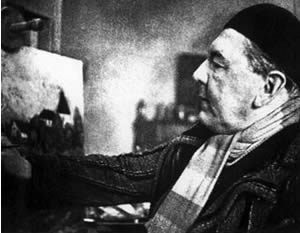
Vítězslav Nezval
(26 mei 1900 6 april 1958)
De Belgische, Franstalige, schrijver en essayist Ivan O. Godfroid werd geboren in Boussu op
26 mei 1971. Zie ook alle tags voor Ivan O. Godfroid
op dit blog.
Uit: Pacte de contrition - Essai sur la folie
La « folie » (le
mot fait peur, mais ce nest que lancien nom des troubles psychologiques) est
non seulement peu connue du public, mais aussi mal comprise par les
professionnels, et traitée de manière insatisfaisante. Que la santé mentale
soit une utopie ny arrange rien. Dans un style séduisant, Godfroid met en
cause lincapacité de la science à expliquer les liens qui unissent le cerveau
et la pensée. Cest tout un pan de la médecine qui se voit affaibli par cette
lacune fondamentale, et ceci explique également lincompréhension profonde du
rôle du « psy » dans la société contemporaine, qui le traite tour à tour en
sorcier moderne, en régulateur social, voire en philosophe domestique. Il faut
sans cesse nourrir le développement de ce domaine en explorant de nouvelles
voies, comme le rôle du sexe du patient, ou encore les implications de leffet
placebo. Godfroid nous propose dès lors la théorie de la psychiagénie comme une
solution inédite au problème cerveau-esprit, et nous révèle comment celle-ci
bouleverse la conception du monde dans lequel nous vivons. Cet essai, qui tente
de susciter la réflexion non seulement par la raison mais aussi par lémotion,
se termine par un plaidoyer sur la nécessaire émergence dun nouveau traitement
: la psychothérapie unifiée. À la fois surprenant et passionnant,
cet ouvrage inclassable sadresse tant au grand public quaux professionnels.
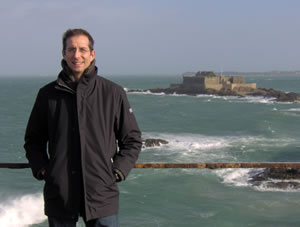
Ivan O. Godfroid
(Boussu, 26 mei 1971)
De Franse schrijver Edmond
de Goncourt werd geboren op 26 mei 1822. Zie ook alle tags voor Edmond de Goncourt
op dit blog.
Uit: Histoire de Marie-Antoinette Samen met Jules de Goncourt)
Au milieu du
dix-huitième siècle, la France avait perdu l'héritage de gloire de Louis XIV,
le meilleur de son sang, la moitié de son argent, l'audace même et la fortune
du désespoir. Ses armées reculant de défaites en défaites,
ses drapeaux en fuite, sa marine balayée, cachée
dans les ports, et n'osant tenter la
Méditerranée, son commerce anéanti, son cabotage ruiné, la France, épuisée et
honteuse, voyait l'Angleterre lui enlever un jour Louisbourg, un jour le
Sénégal, un jour Gorée, un jour Pondichéry, et le Coromandel, et Malabar, hier
la Guadeloupe, aujourd'hui Saint-Domingue, demain Cayenne. La France
détournait-elle ses yeux de son empire au delà des mers, la patrie, en écoutant
à ses frontières, entendait la marche des troupes prusso-anglaises. Sa jeunesse
était restée sur les champs de bataille de Dettingen et de Rosbach; ses
vingt-sept vaisseaux de ligne étaient pris; six mille de ses matelots étaient
prisonniers; et l'Angleterre, maîtresse de Belle-Isle, pouvait promener
impunément l'incendie et la terreur le long de ses côtes, de Cherbourg à
Toulon. Un traité venait consacrer le déshonneur et l'abaissement de la France.
Le traité de Paris cédait en toute propriété au roi d'Angleterre, le Canada et
Louisbourg, qui avaient coûté à la France tant d'hommes et tant d'argent, l'île
du Cap-Breton, toutes les îles du golfe et du fleuve Saint-Laurent. Du banc
de Terre-Neuve, le traité de Paris ne laissait
à la France, pour sa pêche à la morue, que les îlots de Saint-Pierre et de
Miquelon, avec une garnison qui ne pouvait pas excéder cinquante hommes. Le
traité de Paris enfermait et resserrait la France dans sa possession de la
Louisiane par une ligne tracée au milieu du Mississipi. Il chassait la France
de ses
établissements sur le Gange. Il enlevait à la
France les plus riches et les plus fertiles des Antilles, la portion la plus
avantageuse du Sénégal, la plus salubre de l'île de Gorée. Il punissait
l'Espagne d'avoir soutenu la France, en enlevant la Floride à l'Espagne. Mais
l'Angleterre n'était point satisfaite encore de
l'imposition de ces conditions, qui lui donnaient presque tout le continent
américain, depuis le 25e degré jusque sous le pôle.
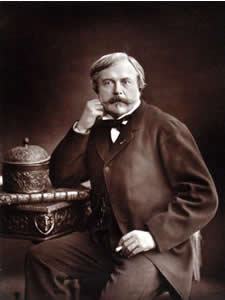
Edmond De Goncourt (26 mei 1822 - 16 juli 1896)
In 1822
De Engelse schrijfster Lady Mary
Wortley Montagu werd geboren in Thoresby Hall, Nottinghamshire, op 26 mei
1689. Zie ook alle tags voor Mary Wortley Montagu
op dit blog.
Uit: Letters
Nuremberg, Aug. 22. O. S. 1716.
After five days travelling post, I could not
sit down to write on any other occasion, than to tell my dear lady, that I have
not forgot her obliging command, of sending her some account of my travels. I
have already passed a large part of Germany, have seen all that is remarkable
in Cologn, Frankfort, Wurtsburg, and this place. 'Tis impossible not to observe
the difference between the free towns and those under the government of
absolute princes, as all the little sovereigns of Germany are. In the first,
there appears an air of commerce and plenty. The streets are well-built, and
full of people, neatly and plainly dressed. The shops are loaded with
merchandise, and the commonalty are clean and cheerful. In the other you see a
sort of shabby finery, a number of dirty people of quality tawdered out; narrow
nasty streets out of repair, wretchedly thin of inhabitants, and above half of
the common sort asking alms. I cannot help fancying one under the figure of a
clean Dutch citizen's wife, and the other like a poor town lady of pleasure,
painted and ribboned out in her head-dress, with tarnished silver-laced shoes,
a ragged under-petticoat, a miserable mixture of vice and poverty. They have
sumptuary laws in this town, which distinguish their rank by their dress,
prevent the excess which ruins so many other cities, and has a more agreeable
effect to the eye of a stranger, than our fashions. I need not be ashamed to
own, that I wish these laws were in force in other parts of the world. When one
considers impartially, the merit of a rich suit of clothes in most places, the
respect and the smiles of favour it procures, not to speak of the envy and the
sighs it occasions (which is very often the principal charm to the wearer), one
is forced to confess, that there is need of an uncommon understanding to resist
the temptation of pleasing friends and mortifying rivals; and that it is
natural to young people to fall into a folly, which betrays them to that want
of money which is the source of a thousand basenesses.
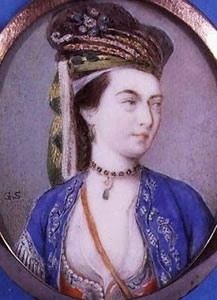
Mary Wortley Montagu (26 mei 1689 21 augustus
1762)
Portret door Gervase Spencer
Onafhankelijk van
geboortedata:
De Nederlandse dichteres Machteld Brands
werd geboren in 1986 in Kampen. Zie ook alle tags voor Machteld
Brands op dit blog.
Kees
Als een bolletje
wol
netjes opgerold
onder donzen dekens
lig je zacht knorrend
van hemels geluk
en genoegzame gedachten
dromend van
bakken vol brokjes
en een kusje op je kop
glanst je vacht mooi
en hoef je toch
nooit in bad.
O, lieve kat
kon ik maar jouw garen
spinnen.
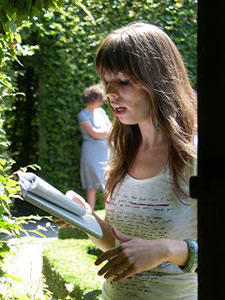
Machteld Brands
(Kampen, 1986)
|



